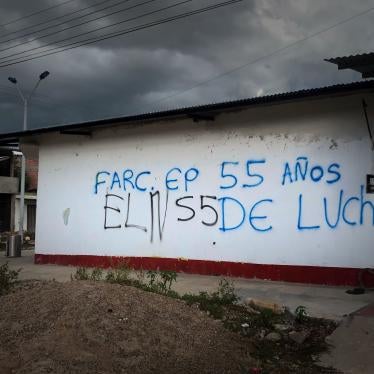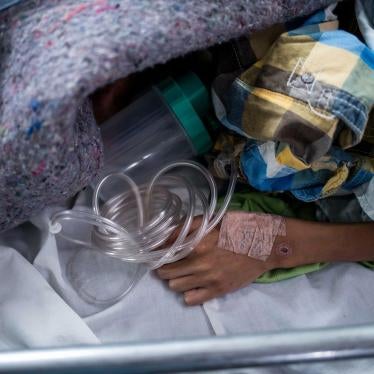(Geneva) –The United Nations Human Rights Council, in extending its Venezuela probe, has sent a clear message to those responsible for ongoing abuses, including in the context of post-electoral repression, that they will be held to account, Human Rights Watch said today.
On October 11, 2024, the council adopted a resolution extending the mandate of the Independent International Fact-Finding Mission (FFM) on Venezuela for two years. The mission was among the first international bodies to assert that Venezuelan authorities have engaged in serious human rights violations that could amount to crimes against humanity. The resolution also asks the UN High Commissioner for Human Rights to continue to monitor and report on the human rights situation in the country.
“The decision to extend the fact-finding mission’s mandate is pivotal given the heightened post-electoral repression in Venezuela,” said Juanita Goebertus, Americas director at Human Rights Watch. “Through this resolution, council members have sent the message that they won’t stand by as Maduro’s forces kill and abuse people to stay in power and that they are committed to holding Venezuelan authorities accountable for their crimes.”
The Human Rights Council established the FFM in 2019 to investigate “extrajudicial killings, enforced disappearances, arbitrary detentions and torture and other cruel, inhuman or degrading treatment since 2014,” with a view to “ensuring full accountability for perpetrators and justice for victims.” Its mandate has been renewed twice, in October 2020 and October 2022.
In September, 30 national and international organizations defending human rights in Venezuela, including Human Rights Watch, urged the council to renew the mandate of the FFM again this year.
The resolution, presented by a group of regional governments—Canada, Argentina, Chile, Ecuador, Guatemala, Paraguay, and Uruguay—was adopted by a vote of 23 to 6, with 18 abstentions. An increase in supportive votes compared to the last resolution in 2022 suggests growing international concern about the deepening rights crisis.
This time, Cuba, Belarus, and Russia introduced hostile amendments that would have undermined the initiative, including amendments that, if adopted, would have terminated the Mission's mandate, labeled Venezuelans on the move purely as migrants and not refugees, and weakened the high commissioner's ability to provide timely updates on the developing human rights situation in Venezuela to the Council. Council members overwhelmingly voted to reject all these proposed amendments.
This resolution also asks the mission to investigate repression following the July 2024 presidential election, including violence by pro-government armed groups known as colectivos.
The resolution expresses alarm at “worsening human rights violations and abuses and increasing restrictions of civic and democratic space, particularly in the presidential elections.” It notes that a “Venezuelan-led solution requires respecting the will of the Venezuelan people.”
On July 28, Venezuelans voted in the presidential election in large numbers, despite irregular government actions and human rights violations. International observers raised serious concerns about the announcement by Venezuela’s electoral authority that Nicolás Maduro had been re-elected president.
Following the announcement, thousands of protesters took to the streets in largely peaceful protests to demand a fair counting of the votes. People, including in low-income areas traditionally supportive of the Chavismo political movement from which Maduro emerged, protested in large numbers. Authorities responded with violence and widespread abuses, including killings, arbitrary detention and prosecution, and harassment of critics.
Human Rights Watch received credible reports of 23 killings of protesters and bystanders and identified evidence linking security forces and colectivos with several of these killings. As of September 30, the local group Foro Penal reported 1,767 “political prisoners” who had been arrested since July 29, including 67 adolescents who remain behind bars.
In its most recent report to the council, in September, the FFM said that following the elections, the government had “reactivated and intensified the harshest and most violent mechanisms of its repressive apparatus,” generating a “widespread climate of fear among the population.”
The FFM concluded that they had reasonable grounds to believe that some of the violations they have investigated over the past year “were committed following the same course of conduct that the mission qualified in previous reports as crimes against humanity.” In previous reports, the mission has identified people “at presidential and ministerial level,” as well as “the directors of the security and intelligence entities,” who should be investigated for their criminal responsibility in that regard. It also consistently highlighted the judiciary’s involvement and the state’s repressive tactics targeting opposition members or those perceived as such, alongside the lack of real reform in law enforcement institutions.
Following the adoption of this resolution, foreign governments should take further steps to support the Venezuelan people, Human Rights Watch said. The European Union and the US government should continue to use their leverage, including targeted sanctions, to press the Maduro government to respect the will of the people and human rights.
The governments of Presidents Gustavo Petro in Colombia and Luíz Inacio Lula da Silva in Brazil should continue assertive efforts to urge Maduro to respect the will of the people, as expressed in the polls, and to respect human rights. They should also explore ways to encourage Maduro’s international allies, including Cuba, to refrain from supporting repression.
Governments should also support the ongoing investigation of the Office of the Prosecutor of the International Criminal Court into crimes against humanity in Venezuela and ensure that the court has the resources it needs to support work across its docket. They should also expand access to asylum and other forms of international protection for Venezuelans leaving their country in line with international standards.








